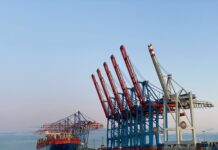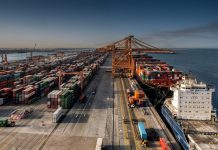In the first quarter of 2018, Latvia recorded the strongest real growth among European states. The seasonally adjusted rise of 5.1 percent has attracted positive interest. The reason for the good economic situation is strong domestic demand, driven by EU funded major projects, and greatly consuming private households. Goods flows in the Baltic States move not least of all via the Ports of Lübeck and Hamburg. Just how closely the German economy is linked to this Baltic state was showcased at an event in Liepaja, Latvia initiated by Port of Hamburg Marketing jointly with the Ports of Lübeck and Liepaja, as well as Stena Line.
In his address, Kaspars Ozoliņš, state secretary in the Latvian transport ministry, stressed: “Relations between Latvia and Germany have always been close, based on open dialogue and trustworthy cooperation. Germany is one of Latvia’s most important strategic economic and trade partners, and our partnership is continually developing.” Ingo Egloff, Joint CEO of Port of Hamburg Marketing elaborated how important the Baltic Region, with the upcoming Baltic States, is for the Port of Hamburg: “In the rankings of the most important trading partners for the Port of Hamburg, ‘supposedly little’ Latvia plays a significant role.” A dense network of feeder liner services excellently connect the Baltic State to Hamburg’s overseas port.
The Port of Lübeck, too, with its ferry service to Latvia run by Stena Line is considered as an important pooling hub for goods flows between Germany and Latvia: “For the services to the Baltic States and Russia, Latvia, and more specifically Liepaja, is an important strategic partner. We are taking real steps to further strengthen the Lübeck – Liepaja axis,” emphasized Sebastian Jürgens, CEO of Lübecker Hafen-Gesellschaft.
“We are looking forward to continue to grow our partnerships, business and freight volumes on the Travemunde-Liepaja route”, said Oskars Osis, Stena Lines Freight Commercial Manager for Baltic Sea North.
In his address, Jānis Lapiņš, CEO of Liepaja Special Economic Zone Authority, emphasized the pleasing development of the Zone that belongs to the port. The Port of Liepaja has a major share of local freight, making up 40 percent of total cargo volume. Apart from the well-established ferry and Ro-Ro traffic, in the Port of Liepaja there is a considerable handling volume of German cargo.
This event for Latvian and German representatives from the worlds of business and politics aimed at strengthening existing relationships and to prepare the way for further developments between the ports and the business partners. For Marina Basso Michael, Head of market development Baltic Region/Eastern Europe at Port of Hamburg Marketing – HHM, this meeting was the next step after a successful event almost two years ago in Riga: “Mutually shared information leads to more cooperation between trading partners. German and Latvian businesses and ports profit equally,” stated Marina Basso Michael. “Latvian logistics profits from the transit traffic with Russia and the other CIS states, making a major contribution to the national gross value-added.”





